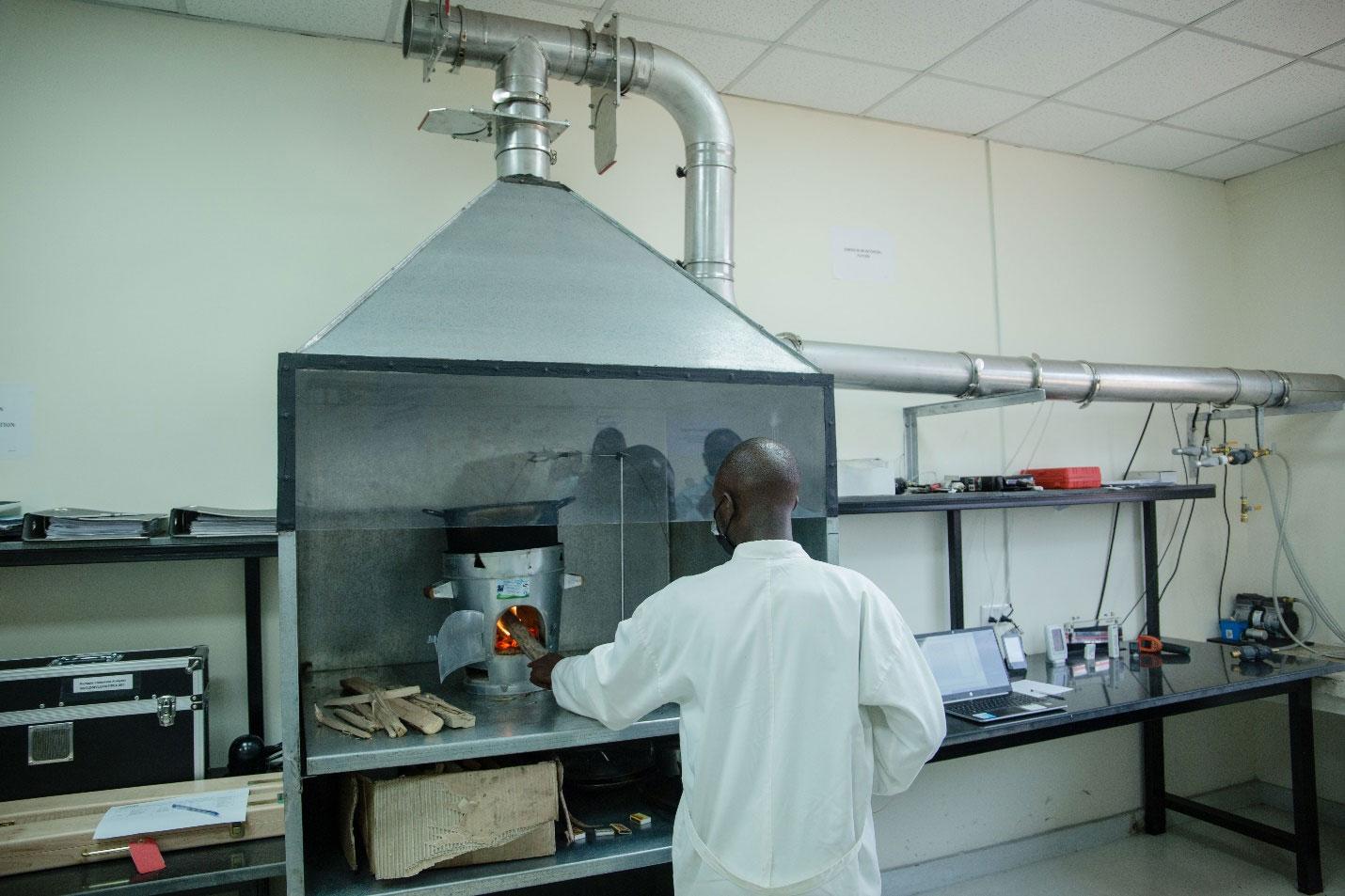
Africa-Press – Rwanda. The recently established Rwanda Standard Board (RSB) Cookstove and Energy Efficiency Testing Laboratory is helping cookstoves manufacturers to produce S-Mark certified and energy-efficient stoves that reduce smoke and firewood usage by over 50 per cent.
The $370,000 laboratory offering quality testing services was funded by the Project dubbed “Improving Efficiency and Sustainability of Charcoal and Woodfuel Value Chains Project.”
Launched in 2017, the Project is implemented by the Rwanda Environment Management Authority (REMA) with the support of the Nordic Development Fund through the World Bank.
REMA implements the Project in collaboration with the Rwanda Forestry Authority and Rutsiro, Rubavu, Nyabihu, Ngororero, Nyamagabe and Nyaruguru districts. The Project aims to improve the efficiency and sustainability of wood fuel value chains in the North-West of Rwanda through improved woodlot management, improved seed quality, efficient charcoal production and biomass processing, and promotion of alternative sources of energy.
The initiative has also supported the creation of a Cookstove Testing Laboratory at the Rwanda Standards Board. “We all know that the use of traditional stoves can also have a significant impact on deforestation and climate change. This alarming situation creates a critical need for cookstoves that significantly and verifiably reduce fuel use and emissions, in order to reach protective levels for human health and the environment in general,” says Juliet Kabera, Director General of REMA.
The laboratory provides testing and certification for locally manufactured cookstoves, calculates emissions and offers other services related to renewable energy testing.
Rwanda Standard Board (RSB) established Cookstove and Energy Efficiency Testing Laboratory to fuelling reduction of firewood usage.
Raymond Murenzi, Director General of Rwanda Standards Board (RSB), noted that the laboratory, one of the other existing testing materials at Rwanda Standards Boards, supports all projects aimed at contributing to the realization of national targets to embrace the use of cleaner sources of energy, fight air pollution and other environmental protection efforts.
“The laboratory is aimed to ensure manufactured cookstoves meet quality and safety requirements for the protection of both users and the environment; that they use less quantity of firewood, charcoal, pellets and others. We test the manufactured cookstoves’ emissions, safety, durability, and thermal efficiency to ensure the results meet the specifications laid down in the standards. Testing services offered not only to facilitate cookstove manufacturers but are also used to improve on new product formulation, research, procurement of cookstoves to be disseminated to the public, etc.,” he said.
Manufacturers used to take cookstoves to regional countries for testing, which was costly. Currently, the established laboratory offers the service at costs that are fifteen times lower than the cost used to be incurred by customers when they had to get their products tested in other labs in the region.
Murenzi said that while testing the cookstoves, they recommend what can be improved and redesigned to meet required standards adding that “the test reveals the consumption of cookstove in terms of woodfuel or whether the cookstove emits a lot of particulate matter, carbon monoxide and carbon dioxide. This is where we recommend the improvement,” he noted.
Since October last year, over 100 samples of cookstoves have been tested in the laboratory. Each sample represents thousands of a type of certain cookstoves and companies.
Manufacturers speak out
According to Anicet Munyehirwe, the CEO of Geni Green Solutions (GGS) Ltd., the local stove manufacturer, the laboratory allowed them to improve the quality of the stoves and meet the standards in a short time and at a low cost compared to what they use to spend to test their products in regional laboratories.
“We used to ship the sample toregional laboratories, pay a minimum of $1,500 to test one sample stove and wait for months to get results. The time to get results was due to the shipping time and the number of samples the regional laboratories have for testing”.
“In less than six months after its establishment, the laboratory tested our stoves more than 5 times, and this allowed Geni Green Solutions (GGS) Ltd to improve the quality of its products to national and international standards”. The stoves of GGS Ltd’s reduce fuel consumption and emission by more than 50%, are now the first stove to get S-Mark and compete with products from abroad and in the region.
The company began operations in 2018 to provide convenient and affordable cooking solutions that reduce the negative environmental and health impacts of traditional Cookstoves. It has so far distributed more than 50,000 stoves across the country that use wood, briquettes, forest residues and charcoal. The company also produce carbonized and non-carbonized briquettes using techniques that increase the productivity of wood by more than three times compared to current methods. The laboratory has also tested some of the fuels produced by GGS Ltd and established their calorific value.
A technician testing the quality of Cookstove in the Laboratory of Rwanda standard board.
GGS Ltd. aims to disseminate certified cookstoves to more than half a million rural and urban households in the next five years and establish briquettes production units in each District. The combination of cookstoves and cooking fuels produced by GGS Ltd will reduce fuel consumption and emission by more than 75% of the methods currently used. The use of GGS Ltd’s products will significantly contribute to the NST 1’s target to reduce the dependence of Rwanda on the use of biomass from 79.9 per cent in 2018 to 42 per cent by 2024.
GGS Ltd’s CEO recommended that an awareness campaign on the benefit of using certified cookstoves and fuel, the establishment of national stoves and fuel field quality control and progressing enforcement of the standards should complement the establishment of the laboratory to assure its sustainable impact.
NDF Project’s contribution to the increase of forest cover
The “Improving Efficiency and Sustainability of Charcoal and Woodfuel Value Chains Project” has also trained over 2,340 forest farmers on improved forest management practices and managed to apply those technics on 1487 hectares, including new-planted 951 hectares.
Around 218 cooperative members from 9 cooperatives were also trained on seed collection and handling technologies to supply seeds on the newly established and rehabilitated Tree Seed Centres in Gatsibo and Huye Districts, respectively.
The Project rehabilitated seed stands on 62 hectares at 17 sites countrywide, established a 22-hectare tree seed stand in Karongi District (Gakuta) and Nyagatare District (Kirebe), where the above-mentioned cooperative members will be collecting seeds.
Under the component of sustainable charcoal production, more than 600 cooperative members from 19 cooperatives have been trained on efficient charcoal production and biomass processing and provided with equipment for green charcoal making. The charcoal is produced in a way that its density increases to the extent that few charcoals; can cook a lot of food.
The NDF Project has also introduced a new technology dubbed “cloning program” on 0.5 hectares at the Arboretum in Huye District. The cloning program aims to initiate the production of more resilient tree seeds to climate conditions and generate more productive species.





